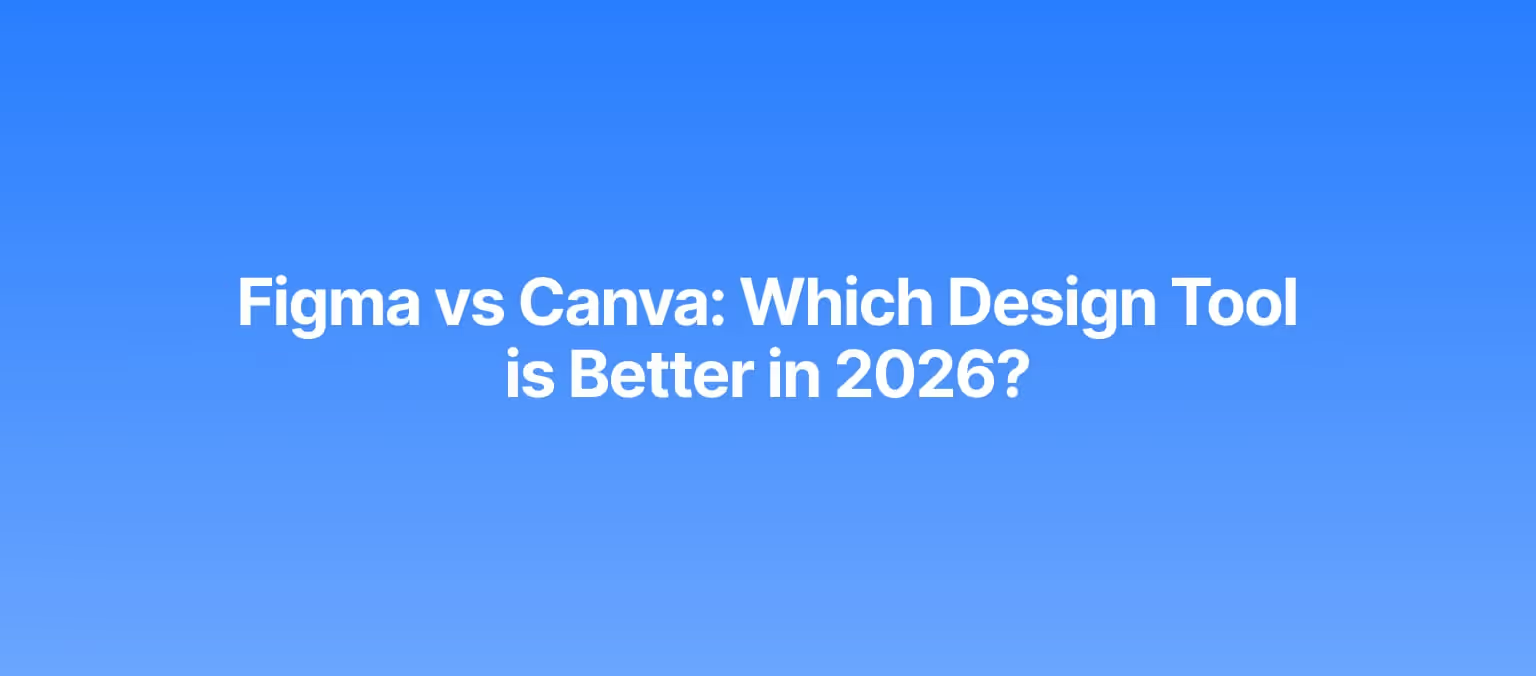AI for B2B Lead Generation: The Ultimate Guide
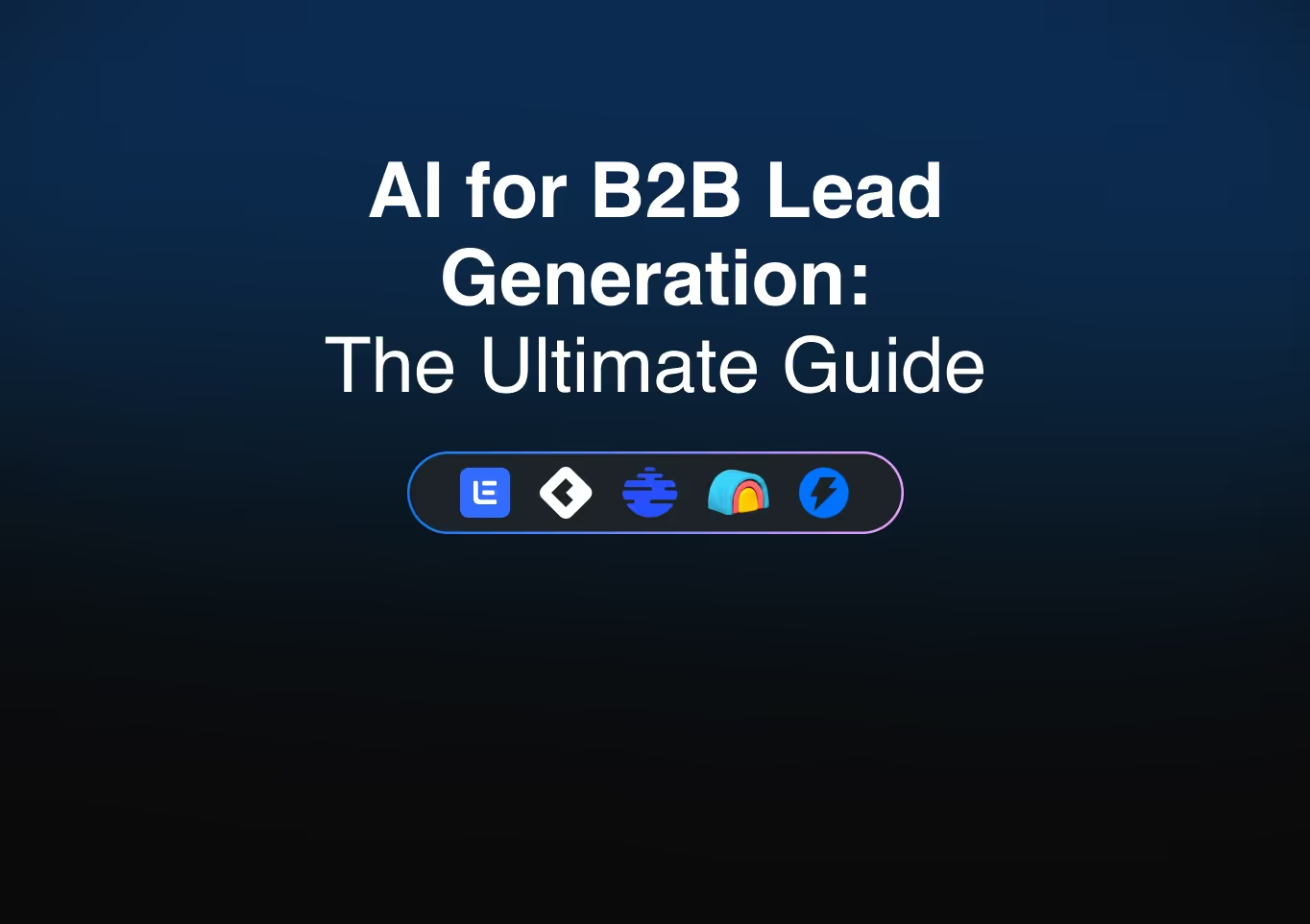
Let’s face it — traditional lead generation is challenging. You waste hours researching cold prospects and sifting through vast data, only to fuel your pipeline with low-quality leads. As if that’s not enough, your sales team failed to meet the quota, slowing revenue growth.
But what if there were a way to avoid this situation?
With AI-powered B2B lead generation, your sales teams can transform their lead generation process by attracting, identifying, and nurturing leads with high-conversion potential. In this ultimate guide, you’ll learn about AI for B2B lead generation, its benefits, areas of application, potential challenges, and top tools you can leverage to boost your sales efforts. Let’s get started.
What is AI-powered B2B Lead Generation?
AI-powered B2B lead generation is the use of artificial intelligence (AI) sales tools to generate qualified leads and drive conversions for businesses. It leverages AI algorithms and machine learning to analyze vast amounts of data to find ideal buyers that align with your ideal customer profile (ICP).
For instance, you can use an AI-powered lead database to curate a B2B lead list of CEOs with valid email addresses and work at a real estate firm. You can also use an AI sales agent to find retail companies located in San Francisco with annual recurring revenue of $100 million.
Rather than sourcing potential leads on Google or LinkedIn, sales and marketing teams can leverage AI-driven lead generation strategies to find and generate high-quality leads.
Why Should Businesses Use AI to Generate B2B Leads?
Considering that salespeople who use AI are 1.3x more likely to witness revenue increase than those without AI, it’s not surprising that intelligent technology has become a necessity for businesses in this digital age.
However, there is more to this technology than just revenue growth. Let’s look at some reasons why businesses should use AI to generate B2B leads.
1. Boost Productivity
Salespeople spend a lot of time searching for qualified leads. The raw numbers show that reps spend 28% of their week selling while engaging in other time-consuming activities like researching prospects, prioritizing leads, manual data entry, and other administrative tasks.
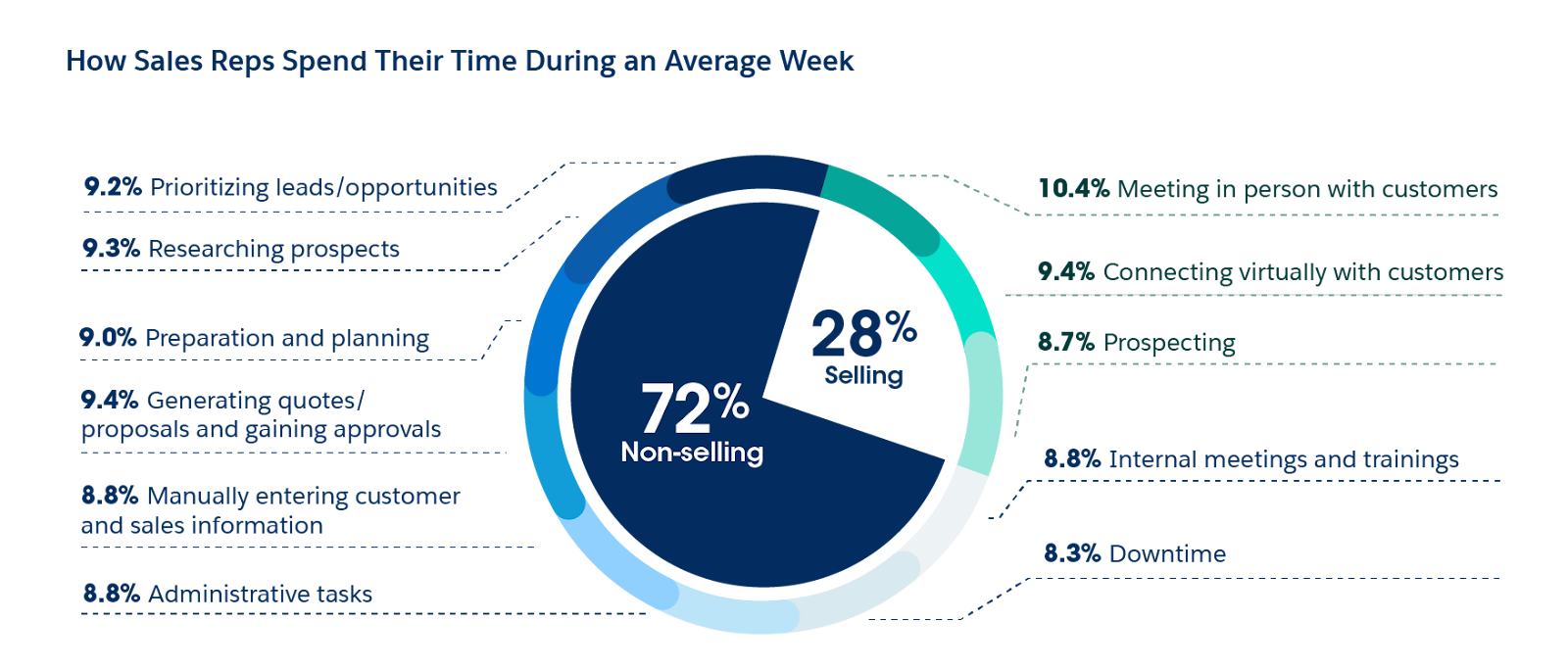
If you take a deep look at where your team’s time actually goes, you’d realize this explains why AI sales tools have become essential in every modern salesperson’s tech stack. With AI, salespeople can save up to 5 hours per week on their job when incorporated into their workflow. This will not only boost productivity but also allow you to focus on more high-value tasks like closing deals.
2. Informed Decisions
According to Salesforce, many sales professionals admit that rising customer demands and competition are their top challenges. Fortunately, sales reps can use AI-powered tools to analyze vast amounts of this data to spot patterns and gain valuable insights from customer conversations. This allows sales teams to make informed decisions, ensuring they don’t miss out on potential opportunities.
3. Improved Personalized Outreach
With 41% of SDR leaders citing messaging as one of the biggest challenges at work, there is a need for salespeople to reconsider their outreach strategy. AI has made it easier for teams to streamline their outreach strategy and reach more leads with personalized messages. They can uncover information about your leads, which you can leverage to create hyper-personalized messages.
Five Application Areas of Using AI to Generate B2B Leads
Now that you know why your business should use AI, you should also know how to apply the technology to various areas of the B2B lead generation process.
1. Predictive Lead Scoring
Traditional lead scoring is like throwing darts in the dark. Salespeople rely on their guts and use fixed criteria to analyze customer data, assign scores, and qualify them. While this manual analysis doesn’t only waste time, it’s also prone to errors and human biases.
However, AI-powered lead scoring provides a holistic approach to lead qualification. In Gartner’s Future of Sales Report, 60% of B2B sales organizations will transition from intuition-based selling to data-driven selling. Rather than relying on their gut to determine whether a lead is “qualified” or “unqualified,” sales reps can use AI to analyze data from different sources, gain actionable insights, and identify leads with high conversion potential.
When interviewed about his process, Dujam Dunato, GTM Engineer at ColdIQ, says, “I use AI like Perplexity to score leads primarily by extracting and analyzing information from various data sources like their websites, LinkedIn profiles, and other public sources, and then matching that enriched data to a predefined ideal customer profile (ICP). If the lead matches enough high-value criteria, they receive a higher score.”
2. Data Enrichment and Intent-Based Targeting
Let’s say you have 1,000 leads in your list with no verified email addresses or phone numbers. How do you find their contact details and reach them? Well, there is only one answer — AI-powered data enrichment tools.
Many data enrichment services find your prospect’s contact data within seconds. All you need to do is supply your lead’s name, company, or LinkedIn URL. You can also opt for a waterfall enrichment solution that sequentially searches many vendor databases to find your lead’s contact information. Notable examples include Clay and FullEnrich.
Additionally, AI-powered tools track intent signals to find leads interested in your business’s offerings. Anthony Natoli, Senior Account Executive at LinkedIn, says, “People book meetings when you’re talking about the relevant problems to the right persona at the right time.”
AI-powered tools analyze different sources to identify the right signals at the right time, ensuring you don’t miss out on potential opportunities. Whether it’s website visits, fundraising, expansion, relocation, or a change in job role, they provide the right sales triggers to ensure you identify your audience’s pain points and solve them at the right moment.
3. Automated Email Outreach and Personalization
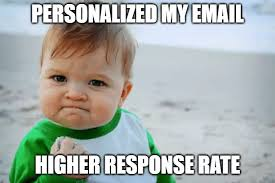
If you’re still crafting personalized messages and automating email outreach manually, you’re probably wasting time and inhibiting productivity. Fortunately, AI-powered outreach tools have made communication easier by enabling you to craft personalized messages and send them to your potential customers. With tools like Synthesia, which are all about creativity and personalization, you can make an interactive video for each prospect in minutes, making your proposal stand out and irresistible not to respond to.
A state of an AI report revealed that 71% of businesses use generative AI to create the most value, making the technology indispensable. They can create personalized content that resonates with their most promising prospects, driving a higher response rate and engagement.
4. AI Chatbots for Lead Nurturing
A good salesperson knows that website visits, especially on your pricing or demo page, signify high interest in your product or services. But how do you ensure you don’t miss out on these leads?
Use AI chatbots. These chatbots engage your website visitors and provide personalized, real-time interactions to convert them. They work around the clock and proactively nurture leads, making it an essential tool for AI lead generation.
5. Social Media Listening and Engagement
AI-powered tools also have capabilities to help you understand your audience on social media. With social media listening and sentiment analysis algorithms, they can identify sentiment and emotions expressed in specific content and classify your posts as positive, negative, or neutral.
These valuable insights help you understand your customers’ reactions and make informed decisions on how to better engage with your audience. This approach enhances your brand’s reputation and helps you stay ahead of the competition in the social media landscape.
Key Metrics to Track in AI-Powered B2B Lead Generation
When using AI in your B2B lead generation, it’s essential to measure its effectiveness. This will help to measure your performance and optimize your process in areas that need improvement. It will also help you determine whether your investment is worth it.
That said, here are some key metrics to track:
- Number of Leads Generated: This is the total count of leads generated over a specific period through an AI-powered method.
- Lead Conversion Rate: This measures the percentage of leads that move to the next stage in the sales funnel or convert into paying customers.
- Cost Per Lead (CPL): This is the average cost of acquiring a lead through AI-powered methods.
- Lead Quality Score: This is the percentage of leads that fit your ICP and are likely to convert.
- Lead Source Attribution: This identifies the source of each lead through an AI-powered method like predictive analytics, intent signals, and more.
- Time to Conversion: This is the amount of time it takes to convert a lead from an initial point of contact to a paying customer through AI-proven methods.
- Engagement rate: This measures the level of interactions with AI-generated content like emails, videos, and social media posts.
What Are the Challenges of AI-Powered B2B Lead Generation?
While AI offers various advantages to the lead generation process, it also has its drawbacks. Here are some challenges of using AI in B2B lead generation.
1. Data Quality
Inaccurate and outdated data can affect the result of your sales process, whether it’s flawed predictions, wrong signals, or ineffective messages. As a result, quality data is paramount when using AI. Salespeople should ensure that the data input into the AI tool is clean, accurate, and complete. This will ensure accurate and consistent results that can boost your sales efforts.
2. Wrong Prompts
A poorly formulated prompt can generate inaccurate or incomplete responses, limiting your team’s progress. Harry Mason, Senior GTM Engineer at ColdIQ, says, “Many people can't get AI to work for them and actually burn up a ton of time just trying to prompt AI correctly.” To solve this issue, ensure to use clear language to refine the prompts. Make it specific and provide relevant context. You can also use an AI tool that simplifies the prompt process.
Harry Mason further advises, “We counteract this by using Claude's Anthropic prompt generator, which lets you explain what you want in plain English and will do the heavy lifting of creating a bulletproof prompt. For example, a simple prompt for finding LinkedIn profiles could be an 8-step prompt that Claude provides to find the information.”
3. Lack of Human Oversight
Using AI without human oversight creates more problems than it solves. For instance, Salesforce’s Generative AI report revealed that 68% of salespeople agree that generative AI lacks human contextual knowledge. In other words, salespeople can’t use it for complex interactions such as objective handling and negotiations, as it could fuel frustration in customers.
As a result, there is a need for human oversight to avoid impersonal messages that could annoy or frustrate customers seeking real conversations. This helps you get the most value from the tool and harness its full potential.
4. Ethical and Privacy Concerns

Using AI to find B2B contact data could increase the risk of non-compliance issues with data regulation institutions like GDPR and CCPA. Failure to abide by these regulations leads to serious legal sanctions, like heavy fines. Hence, salespeople should ensure their AI lead generation tools comply with relevant regulations.
What is the Future of AI in B2B Lead Generation?
AI is a catalyst in B2B lead generation, transforming the process with efficiency and enhanced precision. According to Boston Consulting Group, the future of AI will continue to create more value, driving 1.8x margin impact through customer lifetime value (CLV) and GTM efficiency.
As the technology improves, AI tools will continue to enhance the lead generation and qualification process. For instance, AI sales agents can handle the sales process from acquisition to support. It could also improve the sales team’s performance in various ways, such as accurate sales forecasts, lead predictions, data enrichment, and sales engagement. Overall, AI sales tools should lead to quality pipelines filled with the right decision-makers that could drive revenue growth for businesses.
5 Top AI-Powered B2B Lead Generation Tools
Let’s explore five top AI-powered lead generation tools.
1. Lemlist
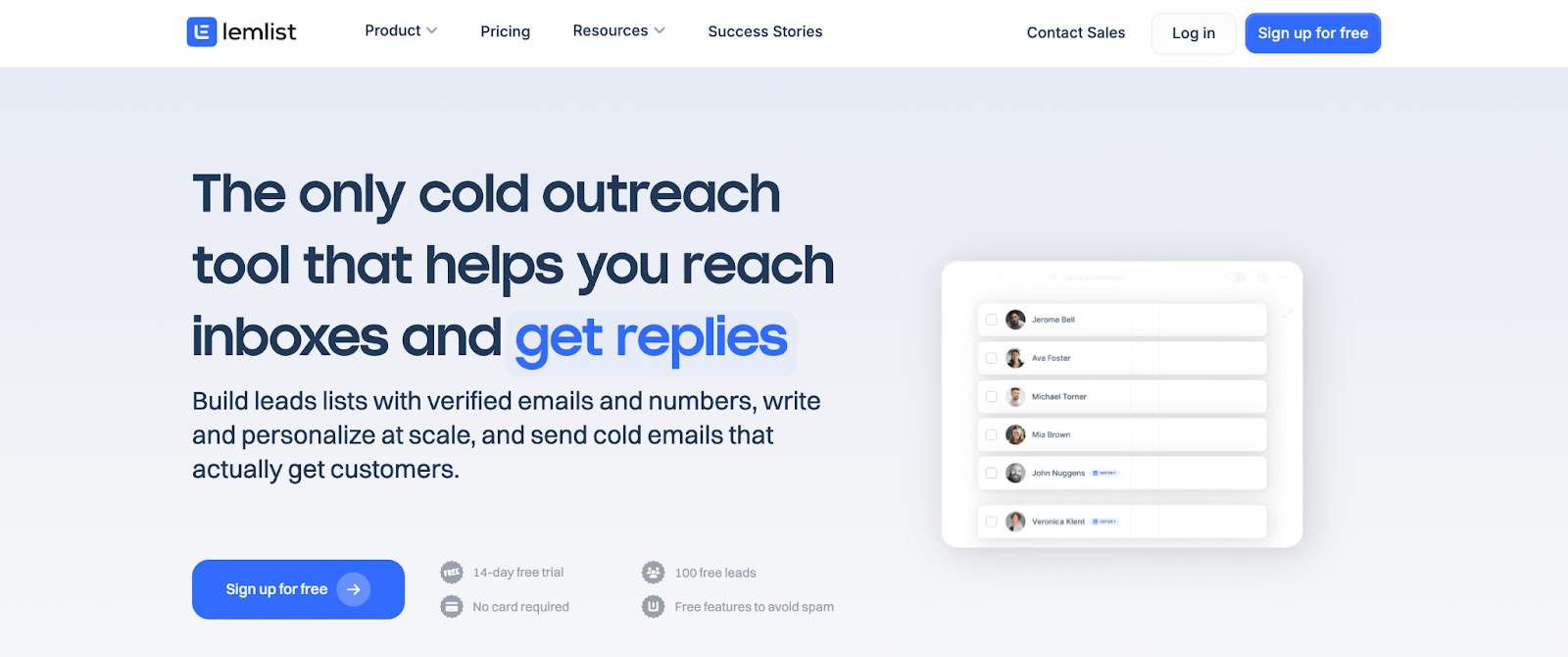
Best for: All-in-one Prospecting
Overview
Lemlist is an all-in-one solution designed for sales teams to enhance their lead generation process and scale their outreach efforts. It’s suitable for sales leaders, sales representatives, and revenue operations managers seeking to advance their sales efforts.
Top Features and Benefits
- People Database: Lemlist features a 450+ million lead database to find qualified leads for your business.
- Email Finder and Verifier: Lemlist offers a waterfall enrichment solution to find your leads’ valid email addresses.
- AI-powered Engagement: Users can use this feature to craft personalized messages that resonate with your ideal buyers.
- Multi-channel Sequencing: Lemlist allows users to reach their potential customers on different channels like emails, phone calls, or LinkedIn.
- Email Warmup and Deliverability: Users can warm up their email sequences to ensure their emails land in their prospect’s inbox, not the spam folder.
Pricing
Lemlist’s pricing plans start at $69 per month.
2. Ocean.io
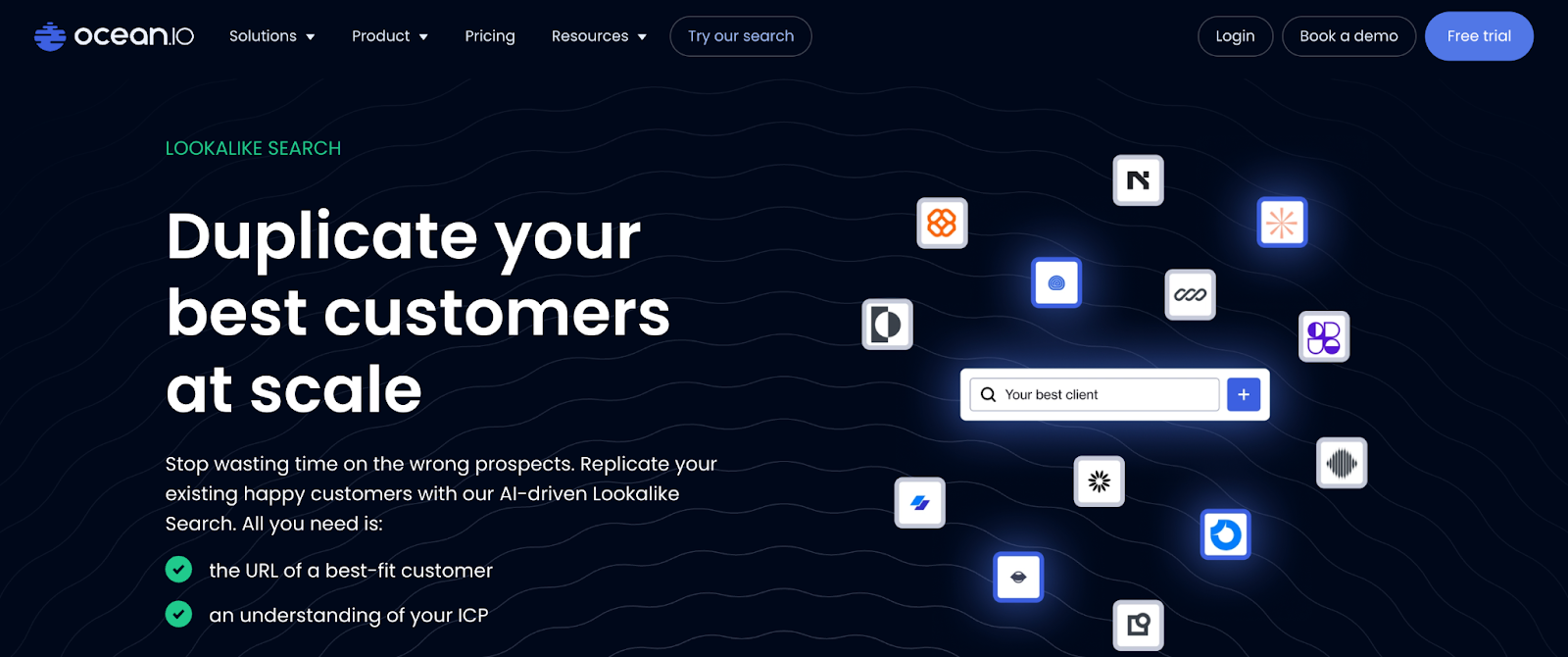
Best for: Lookalike Search
Overview
Ocean is an AI B2B lead generation platform that offers lookalike search for businesses. With a detailed ICP and URL of your best-fit customer, you can find companies similar to your ideal buyers, boosting your lead generation efforts.
Top Features and Benefits
- AI Company Search: With its proprietary algorithm, this feature collects and analyzes vast data to find companies similar to your ideal buyers.
- AI People Search: This feature collects and analyzes extensive data to find lookalikes of your happy customers.
- Chrome Extension: Ocean features a Chrome extension that you can integrate with your browser to enhance your prospecting efforts.
Pricing
Ocean offers a free trial, but its paid plans start at $79 per month.
3. Clay
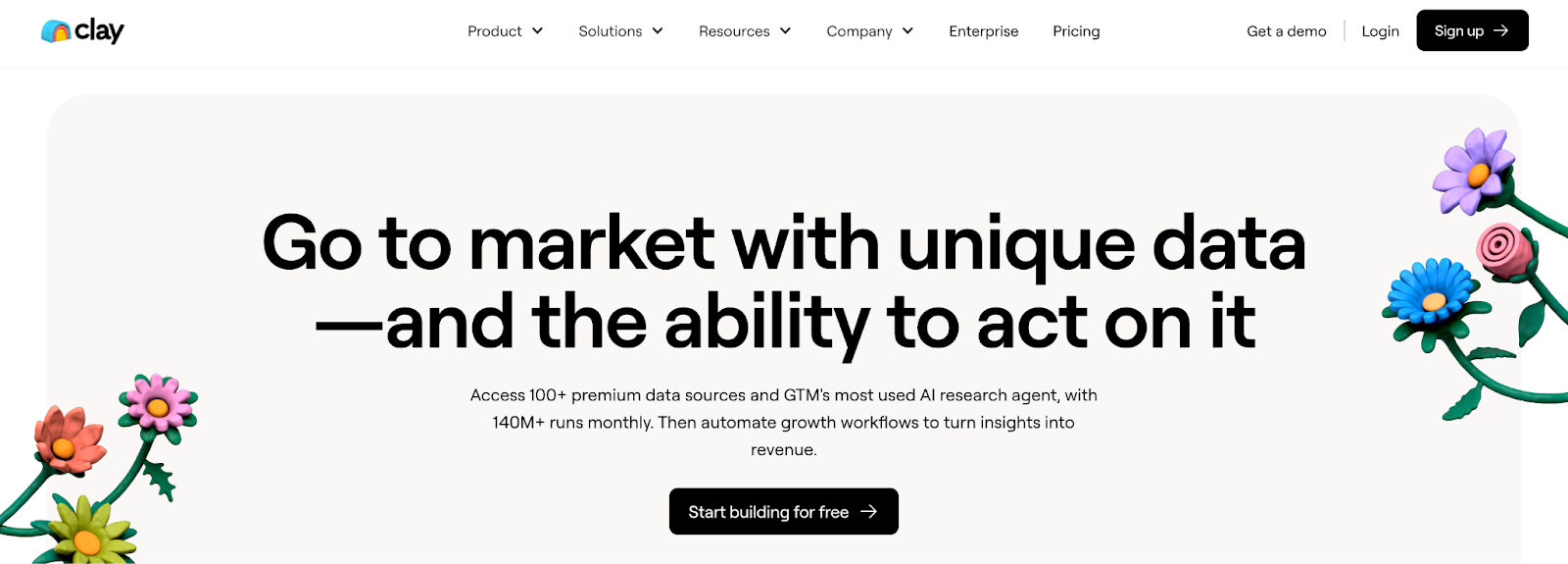
Best for: Data Enrichment and Intent Data
Overview
Clay is a data enrichment and outreach automation platform built to advance your sales efforts. It’s ideal for sales teams, revenue operations, and growth teams seeking to scale their outreach efforts.
Top Features and Benefits
- Data Enrichment: Clay uses waterfall enrichment to access over 100 databases and maximize coverage of contact information — email addresses and phone numbers.
- Intent Data: Clay offers intent signals like job changes or new hires to enable you to contact your ideal buyers at the right moment.
- AI Research Agent: Clay’s AI agent searches public data sources like websites to find valuable lead information.
- Integrations: Clay integrates with numerous third-party platforms, like CRM, for a streamlined workflow.
Pricing
Clay offers a free trial with limited credits, but its paid plans start at $149 per month.
4. Common Room

Best for: Intent Signals
Overview
Common Room is a customer intelligence platform designed to improve go-to-market (GTM) strategies and operations. It offers intent signals to businesses, ensuring they don’t miss out on potential sales opportunities that drive growth.
Top Features and Benefits
- Buying Signals: Common Room collects and analyzes intent signals from various sources to provide actionable insights and seize sales opportunities.
- AI Agent: The platform’s AI sales agent, Roomie AI, runs outbound operations to create a healthier pipeline for businesses.
- Integrations: Common Room integrates with over 50 tools, like CRM and collaboration tools, for easy data transfer and enhanced workflow.
Pricing
Common Room’s Starter plan starts at $999 per month.
5. Instantly
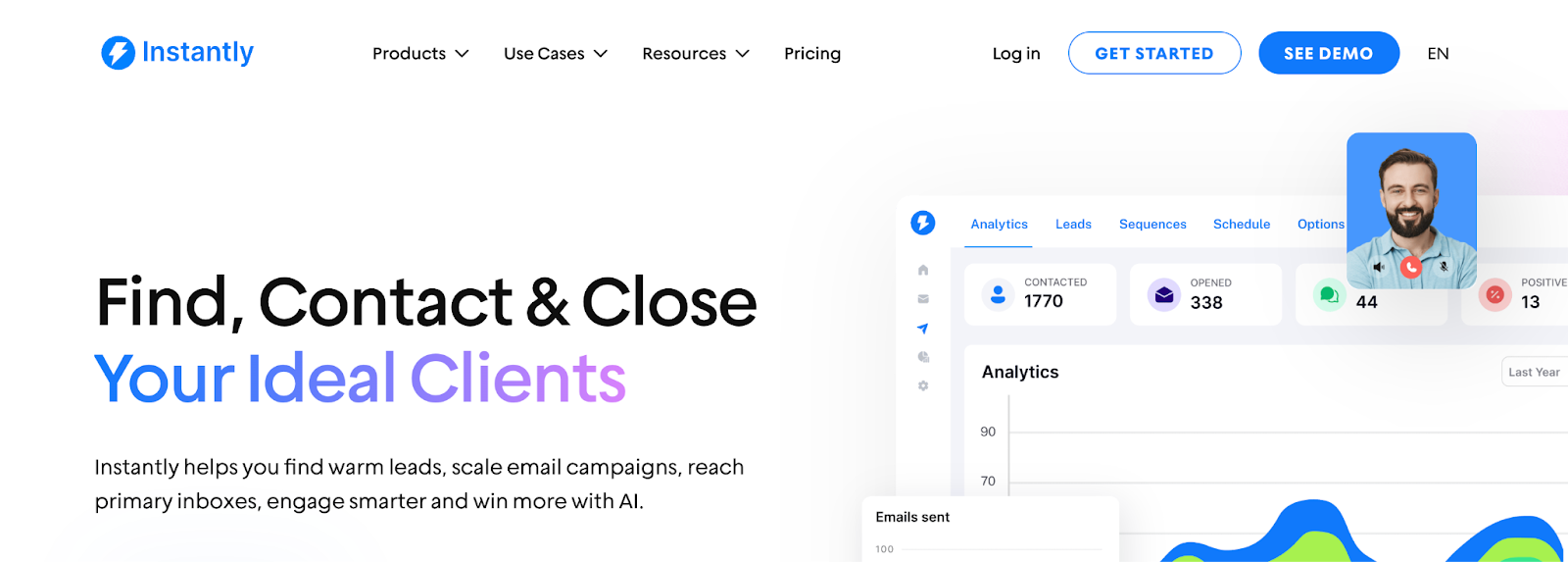
Best for: Sales Engagement and Lead Intelligence
Overview
Instantly is a sales engagement platform that enables sales teams to find warm leads and scale their email campaigns. It’s suitable for sales teams, founders, agencies, and growth teams seeking to boost their cold outreach efforts.
Top Features and Benefits
- Lead Database: Instantly’s B2B lead finder has over 150 million contacts that sales teams can use to find qualified leads.
- Outreach: The platform’s outreach feature automates the email sending process to drive efficient delivery.
- Email Deliverability: Instantly’s deliverability feature warms up email accounts to ensure safe email delivery into the prospect’s inbox.
Pricing
Instantly’s pricing plans start at $37 per month.
Essential Features to Consider in AI-Powered B2B Lead Generation Tools
Before you select an AI-powered lead generation tool, here are some factors to consider:
1. Customizable AI models for industry-specific needs
The chosen AI model shouldn’t be generic. Ensure it’s tailored towards your industry needs for specific applications to generate accurate results and achieve high performance.
2. Seamless CRM Integration
Your B2B prospecting tools should integrate with CRMs to streamline your sales efforts. For instance, if you’re using a CRM like HubSpot, you can transfer data seamlessly and avoid workflow disruptions.
3. Advanced Analytics and Reporting
Ensure your AI lead generation tool has advanced analytics to test and track performance. This helps to achieve your goals and determine whether they’re worth the investment.
Conclusion
If you’re still implementing a manual approach to B2B lead generation, chances are you’re missing out on opportunities. It’s time-consuming, expensive, and often generates undesired results.
However, AI-powered lead generation tools can automate the grunt work and drive efficiency to fuel your sales pipeline with warm leads faster. On top of that, you get to enjoy endless opportunities that drive revenue growth. Partner with ColdIQ to scale your sales operations with an AI B2B lead generation strategy. Book a demo today!
FAQs about AI B2B Lead Generation
1. How does AI improve B2B lead generation?
AI improves B2B lead generation by discovering information about leads in less time, allowing sales teams to focus on other essential tasks like closing deals.
2. Is AI lead generation cost-effective?
Yes, AI lead generation is cost-effective in the long run as it offers advantages such as reduced manual tasks, improved efficiency, and minimized errors, resulting in better ROI.
3. What is the best AI tool for B2B lead generation?
There is no single best AI tool for B2B lead generation, as it depends on your team’s needs and overall business objectives. But you can consider top tools like Lemlist, Ocean.io, Clay, Unify, and more.
4. How do I ensure data security when using AI for lead generation?
You can ensure data security with AI by making sure your preferred tool has encryption features to protect sensitive data and complies with industry regulations.
FAQ
Many companies overlook data cleanliness and regular updates, leading to inaccurate lead insights. Poor integration with existing tools also hampers workflow efficiency. Addressing these prevents wasted effort and maintains reliable prospect targeting.
Focus on AI tools offering modular features and free trials to test suitability. Prioritize solutions that automate repetitive tasks, giving your team more time to engage leads effectively. Smart scaling avoids overspending while gaining productivity benefits.
How do human sales skills complement AI-driven lead generation?
What steps ensure ethical AI use in lead generation?
Let's Get Started!
Schedule a 30-minute call with ColdIQ leadership to learn how our outbound strategy and sales tools help generate qualified leads and close deals.
.avif)
.svg)
.jpg)
.jpg)
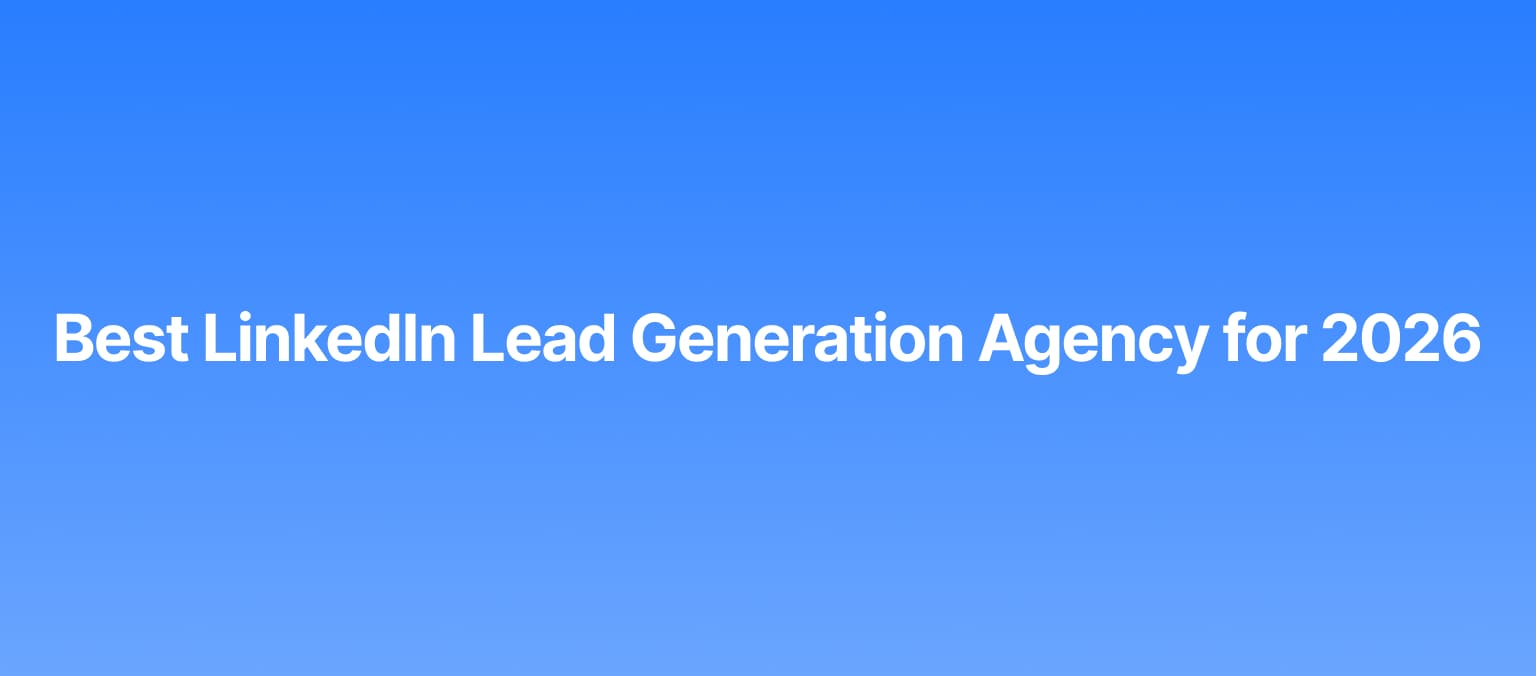
.jpg)
.avif)
